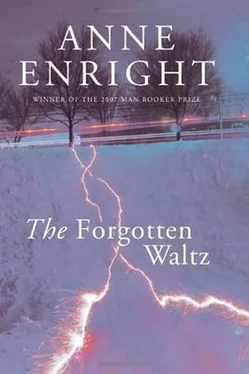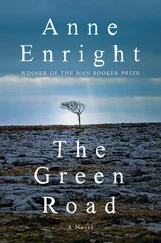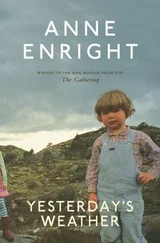The snow does not accuse, or not particularly. But I am alone and I do not know for how long. There is nothing on the internet. The TV rattles on. I sacked two people today, in Dundalk. I mean, I had to let them go. I sit at my laptop with my phone in my hand and wonder how the hell I got here. And where it all went wrong. If it did go wrong. Which it did not, of course. Nothing, as I am tired of saying, went wrong.
What was the last thing he said from Budapest?
‘Goodnight, Gorgeous.’
‘Goodnight.’
‘Goodnight, my love,’ whispering ourselves off the line.
‘Night night.’
Trailing our talk down to the fingertips.
‘Night.’
And gone.
Save the Last Dance for Me
THOSE FIRST MONTHS in Terenure, Seán did not talk about Evie, or mention her much, and I was so stupid, I did not realise he could not bring himself to say her name.
No one came to visit. It was strange, because this has always been an open kind of house – my mother used to complain about it, the way people would drop in almost unannounced. But no one dropped in on the fornicators, the love-birds and homewreckers in No. 4. The phone stayed mute: we did not even rent the line.
I said it to Fiachra: ‘We’re pariahs,’ and, as if to prove me wrong, he rocked up one Saturday morning with a bag of croissants, and a baby buggy the size of a small car.
It took all three of us to get it through the porch and parked in the hall. In the middle of this operation, Fiachra, who is a lanky object, bent over his daughter and unclipped the straps. He lifted her out and handed her to Seán, who without even a feint of surprise, set her on his hip, using his free hand to manipulate the thing closer to the wall. The child started to reach for her father just as Seán started to hand her back to him, and it was all quite deftly done. But Seán followed her with his face and, at the last moment, nuzzled into her fine, blonde hair.
Then he followed her head a little further. And inhaled.
It was unnatural. They might as well have been kissing, my lover and my friend, each of them attached to this large construction of wriggle and big blue eyes and spit.
But Seán wasn’t looking into her eyes. He was smelling her head. His own eyes were closed.
Fiachra said, ‘Watch out, she is a stranger to soap,’ and Seán gave a tiny grunt of appreciation.
‘Who’s a great girl?’ he said, pulling back to look at her. He jiggled her foot, which dangled from the crook of Fiachra’s arm. ‘Who’s a great girl?’
I am not saying it was sexual, I am saying it was a moment of great physical intimacy, and that it took place in my mother’s hall while I held a bag of warm croissants and looked on.
‘Coffee?’ I said.
‘Lovely.’
‘Yes, please.’
But no one moved.
After this first frankness, Seán appeared to ignore the child, who was, I have to say, a sweetie. She sat on her father’s lap and ate her croissant with close and reverential attention while Fiachra told stories about his new life as a stay-at-home Dad. He was queuing up in Cumberland Street dole office with the junkies, he said, his round-eyed daughter watching from her Hummer-buggy, when the guy in front of him holds up a little white plastic newsagent’s knife and waves it around saying, ‘I’ll cut myself, I’ll fuckin’ cut myself!’ The cop snapping on latex gloves as he moves, big and easy, across the floor.
‘God almighty.’
Seán leaned against the counter, and laughed. He moved to set the coffee pot further back on the stove. He went over to the bin and tucked the plastic bin-liner into place. He walked out to the hall, as though there was someone at the door, and then came back in again. After a while I realised that he wasn’t so much ignoring the child as prowling around it. He approached and avoided her, all the time. He was like something on David Attenborough, I told him later, one of those silverback gorillas maybe, who has forgotten where baby gorillas come from, then Mammy Gorilla pops one out, and he doesn’t know what to do. Cuddle it? Eat it? Pick it up and throw it in a bush?
‘Are you finished?’ he said.
‘Probably,’ I said.
‘Good,’ he said. Then he walked out of the kitchen and did not come back for three days.
I had been so stupid. It wasn’t about Aileen – this anguish I had to live with, and avoid, and constantly tend. It was about Evie.
‘I failed her,’ he said.
He stood at the counter with the window at his back, the same place and silhouette as when he watched Fiachra’s child cover herself in apricot jam. It was July, and nothing was figured out yet, not even a holiday. Seán rubbed his hands up over his face, then scrubbed his scalp at the bottom of his skull. His mouth and chin distorted and his eyes shut tight. His throat produced a kind of whine, and tears popped from between his eyelids, round and clear.
He wept. And this was clearly something he had very little practice doing. Seán, the charmer, could not cry in a charming way. He cried like a mutant, all twisted and ingrown.
It did not last long. I made him a Bloody Mary and he sat at the table to drink it. He would not be hugged or touched – I did not try. How could he have done it, he said. To fail a child, it was beyond comprehending. It was not possible to fail a child. But he had done it. He had done the impossible thing.
I held him later, in the darkness, and told him the whole project is about failure. It has failure built in.
At the end of August, Seán brought me with him to Budapest to make up for the way my summer had been laid waste by loving a family man. We walked along the Danube and talked about what he was going to do, and he started to tell me about Evie.
When she was four, he said, Evie fell off a swing in the back garden in Enniskerry and they thought she had concussion. The au pair did not even see it happen, she just looked around to find the child gone, and the plastic seat of the swing still moving. Aileen arrived home to find Evie unwakeably asleep at half six in the evening. There was a trickle of dried blood coming down from the child’s mouth – not much – where she had bitten the inside of her cheek and her pants had been soiled.
‘I change her,’ said the au pair. And she shrugged, as though she was expected to live among savages.
When Seán walked in sometime later, he found his wife trembling in an armchair, Evie watching the ‘Teletubbies’ with a wan, important look on her face and the au pair upstairs, talking a mile a minute into the landline – presumably to her parents – in Spanish. Aileen had, in fact, slapped the girl but Seán was not to know this for some time: it was something he would discover later, when the arguments began. And though the room upstairs was always called the au pair’s room, this was despite the fact that there was no actual au pair after this, and from then on – from that moment on – his life was just.
‘What?’
‘Unexpected,’ he said.
And we turned from the river wall, where he had been watching the water below, and we walked on.
Apart from some speeding cyclists, the quays were quiet. We went across an iron bridge that was guarded by four beautiful iron birds. I said, ‘Bring her to Terenure.’
‘I can’t,’ he said.
‘Why not?’
‘I just can’t.’
‘Some Friday when I am away. Try it. Just bring her through the door.’
When we got back to Terenure, he looked around with an assessing eye. Then he went to the pink shop and bought her a pink duvet and a pink pillow. He also bought a matching net princess canopy for over the bed.
‘I couldn’t pass it,’ he said.
I said, ‘What age is she again?’
Читать дальше












